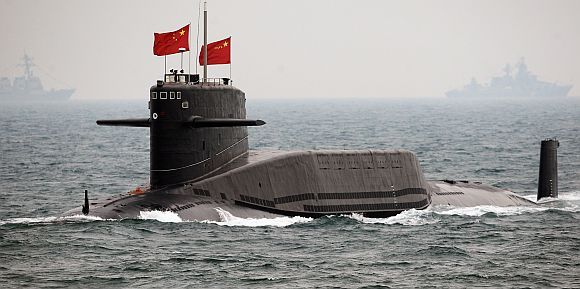
The arrival a couple of days ago of a Chinese nuclear submarine for the first time in Karachi port, coinciding with a Chinese military delegation's visit, points to Pakistan's importance for China, says former R&AW officer Jayadeva Ranade.
While an article published by the Chinese State-run Global Times on May 13 prompted excited coverage by the Indian media, it does need to be carefully assessed.
The article gives an insight into some aspects of the extensive military reforms underway in China as well as the operational orientation of the People's Liberation Army's recently constituted West Zone. It does simultaneously convey a warning to India.
Relevant is that the article, which first appeared in the Communist Youth League's Chinese-language Zhongguo Qingnian Bao (China Youth Daily), was published a day later in the English-language State-run Global Times. In an obvious bid to reach a wider audience it was further publicised via Twitter.
Publication of the article coincides with the increased tension in the South China Sea in the last few days and sharp warnings by China to the US against interference in the maritime dispute. It has been published just days prior to Indian President Pranab Mukherjee's visit to China and the defence minister's upcoming visit to Vietnam.
A clear message was implied in the remark, attributed by Global Times to 'a source close to the matter,' who said, 'The Tibet Military Command, on the other hand, is under the leadership of the Chinese ground forces, which suggests that the command may undertake some kind of military combat mission in the future.'
No timeline was suggested. Coincidentally, four Indian Navy warships left on May 18 for port calls to Vietnam, the Philippines, Japan, Russia and Malaysia.
Beijing has been wary of the growing warmth in India-US ties and its official media has been warning India against interference in the South China Sea dispute.
The suggestion in the Global Times article of 'some kind of military combat mission in the future,' is reminiscent of similar comments made earlier. In 2010, when tension in the South China Sea was high, the China-owned Hong Kong-based media, echoing the old Chinese adage of 'killing a chicken to frighten the monkey,' said China would pick on a big power like India to teach the other countries a lesson.
The Global Times article provided some interesting insights into the military reform and restructuring underway especially in the areas bordering India, or China's 'south-western' border. It clarifies that China will strengthen its forces in the area, thus maintaining military pressure on India.
Confirming that the erstwhile Lanzhou and Chengdu military regions have merged into the newly constituted West Zone, the article indicated that Beijing is giving added importance to the Tibet Military Command.
It disclosed that this 'Command' has been given 'elevated political rank.' which is 'one level higher than its counterpart provincial-level military commands' and, that because it 'comes under the leadership of the PLA,' or China's ground forces, it has an operational role.
Colonel Zhao Zhong, deputy director of the political work department of the Tibet Military Command, was quoted as confirming that 'elevation of the authority level is an expansion of their function and mission.'
The elevated political status allows it to mobilise more military resources.
The references to the 'Tibet Military Command' and the 'Xinjiang Military Command' are new and suggest that the nomenclatures of the former military region headquarters have been changed following their merger with, and subordination to, the West Zone.
An indication is that Zhong, who till 2013 was deputy director of the political department of the Chengdu military region, is now referred to as belonging to the Tibet Military Command in the West Zone.
The Central Military Commission is also deciding on the transfer and appointment of officers, including of the erstwhile Lanzhou and Chengdu MR Air Forces, to the West Zone. Senior level appointments to the West Zone began being made since at least March 29.
Zhan Houshun, former deputy commander of the Chengdu Military Region and commander of the MR Air Force from 2013 in the rank of major general was promoted lieutenant general in June 2014. He was appointed commander of the Western Theatre Command Air Force in March.
His appointment is another indicator that the West Zone's operational area of interest includes Pakistan, protecting the China-Pakistan Economic Corridor and Gwadar, Afghanistan and China's 'south-western' borders.
Incidentally, Lieutenant General Zhan Houshun oversaw the three-week-long joint Sino-Pakistani Shaheen-III Air Exercise in May 2014.
Mention that the 'political status' of the Xinjiang Military Command could be raised in the future and the observation that 'Military commands in Tibet and Xinjiang have always enjoyed special political status in the past and the promotion in rank this time reflects a continuation of China's policy,' underscore the importance accorded to the West Zone by China's CMC.
Confirmation is the observation of Song Zongping, former PLA second artillery officer and Beijing-based Chinese military analyst, that with the changes in military structure, 'the importance of most of the provincial military commands will be diminished.'
Earlier in December 2015, reports had mentioned that commanders of the new military zones would have lower ranks than the predecessor MR commanders.
It is anticipated that the West Zone's area of interest will expand to include Djibouti and protection of Chinese assets and investments in East Africa.
Along with Gwadar, the West Zone's operational jurisdiction will then encompass not only Pakistan, the CPEC and Afghanistan but also the Arabian Sea, the Indian Ocean and East Africa.
The arrival a couple of days ago for a 3 to 4 day stay of a Chinese nuclear submarine for the first time in Karachi port, coinciding with a Chinese military delegation's visit, points not only to Pakistan's importance for China but, additionally, importance of the PLA's West Zone.
It will be interesting to see whether officers of the West Zone were part of the Chinese military delegation.
Jayadeva Ranade, former additional secretary, Cabinet secretariat, Government of India, is President of the Centre for China Analysis and Strategy.











 © 2025
© 2025